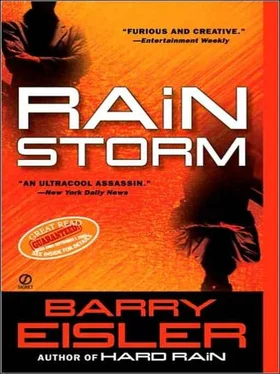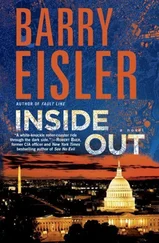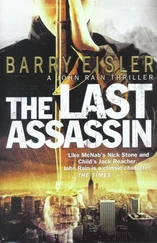We bowed and shook hands, then looked each other over. “You look good,” I told him in Japanese. And it was true. He’d lost a little weight, and seemed younger as a result.
He grunted, a suitably modest form of thanks, then said, “My wife has entered into a conspiracy with my doctor. She cooks differently now. No oil, no frying. I have to sneak into places like this one to satisfy my appetite.”
I smiled. “She’s on your side.”
He grunted again and looked me up and down. “You’re staying fit, I see?”
I shrugged. “I do what I can. It doesn’t get easier.”
We sat down. I said, “You know, Tatsu, that’s the most small talk I’ve ever gotten out of you.”
He nodded. “Don’t tell my colleagues. It would ruin my reputation.”
I smiled. “How’s your family?”
He beamed. “Everyone is very fine. I will be a grandfather next month. A boy, the doctor says.”
My smile broadened. “Good for you, my friend. Congratulations.”
He nodded his thanks and looked at me. “And you?”
“Me…”
“Your family.”
I looked at him. “You know there’s no family, Tatsu.”
He shrugged. “People get families by starting families.”
Tatsu had set me up with a few women not long after I’d first returned to Japan, following the Late Unpleasantness. It hadn’t worked out all that well.
“I think I’m pretty well committed to my exciting bachelor’s existence,” I told him. “You know, meet new people. See the world.”
It came out less flip than I had intended, and maybe with a slightly bitter edge.
“ ‘It doesn’t get easier,’ ” he said. “As you noted.”
I sighed. “Still trying to connect me to something larger than myself?”
“You need it,” he said, his expression serious.
Christ, just what I always wanted-a maternal Tatsu. “Information is what I need,” I said.
He nodded. “Does this mean our small talk is over?”
I laughed, surprised. “I didn’t want to exhaust you. I know you’re not accustomed to it.”
“I was just warming up.”
I laughed again, thinking, Why not .
We wound up discussing all sorts of little things: his joy at his daughter’s pregnancy, and his fear that he and his wife might look at the child as some sort of replacement for the infant son they had lost; his frustration with bureaucratic inertia, with his inability to do more to fight the corruption that he believed was poisoning Japan; the way Tokyo, the way the country, was changing in front of his eyes. And I told him some things, too: how the Agency had tracked me down; how eventually I would have to move, and painstakingly reinvent myself again; how I tried not to despair at the thought that it would all once more prove futile, partly because in the end someone would always come looking for me, partly because some restless thing inside me seemed to insist that I move on regardless. We reminisced over some of the experiences we had shared in Vietnam, when Tatsu had been seconded to the war by the Keisatsucho’s predecessor and I, because of my Japanese, was tasked with liaising with him; the people we had known there, the friends we had lost.
Once we got going, it was hard to stop. I realized how much I missed this form of companionship, how virtually nonexistent it had become in my life. And Tatsu was one of the few people, maybe the only remaining one, in fact, who knew me all the way back to the time before Vietnam and war and killing and everything else that eventually came to define me, a time that, on those infrequent occasions when I care to consider the matter, seems as disconnected and remote as a memory from early childhood.
I realized, too, that this was part of what made me so miss Midori. She made me feel like that previous incarnation, made me believe, foolishly, that I might even shed my current skin and be baptized anew in the incarnation’s unsullied body.
Not a bad dream, that one, as dreams go.
When we were done with the meal, and lingering over tea for Tatsu and a second coffee for me, he said, “I thought you might want to know that a gentleman named Charles Crawley, who has U.S. State Department accreditation, was in Tokyo recently. He contacted the Keisatsucho and made inquiries about you. Do you know this man?”
First Dox, then Kanezaki, now Tatsu. Mr. Crawley was now firmly established on my radar screen.
“I know the name,” I said. “What did you tell him?”
He shrugged. “That we had a whole file on you.”
“And then?”
Another shrug. “We gave him the file.”
I looked at him, incredulous. “You just gave him the Keisatsucho file on me?”
He looked at me and said, “Of course,” in his trademark Why do I always have to spell everything out for these people tone, then paused before saying, “The official file.”
I smiled a little at the wily bastard, relief and even some gratitude ameliorating the irritation I might otherwise have felt at him for playing with me. The “official” file would be bereft of the most meaningful information, the items Tatsu wouldn’t entrust to anyone, and especially not to his superiors, the nuggets that might reveal too much about his occasional resort to extralegal methods in his battle with Japanese corruption.
“What does the official file conclude about my whereabouts?”
“That you are most likely still in Japan. Apparently there have been several sightings in major cities-Tokyo, Osaka, Fukuoka, Sapporo.”
“Really,” I said.
He shrugged. “Of course, I have my own notions about where you might have gone instead. But why would I want to clutter up an official file with speculation?”
He was telling me that he had doctored the file. That he had done me a favor. I knew there would be a favor in return. If not today, then another time, soon.
I nodded, thinking. All right, then . “Now, what about that fucking camera network of yours?” I asked.
Tatsu had access to the world’s most advanced network of security cameras, all tied into an advanced facial recognition software system. He had used the network to find me after I had first left Tokyo and relocated to Osaka.
“No one is using it to track you. If that changes, I will let you know.”
“Thank you. Now, tell me about the man I briefed you on through the bulletin board.”
“Belghazi.”
“Yes.”
“I assume you already have plenty of background.”
“I do. Give me the recent data first.”
He nodded. “Belghazi supplies certain yakuza factions with small arms, working mostly through the Russian mob in Vladivostok. Lately he has been inquiring with these factions about you. I gather you did something to irritate him.”
“That’s possible.”
“He doesn’t seem like the kind of man one should irritate lightly.”
“I’m beginning to figure that out.”
“Would you care to tell me what you might have done to cause such grave offense?”
“I think you can guess.”
He nodded, then said, “He is not a good man. He seems to be without loyalties.”
“My detractors say the same thing about me.”
He smiled. “They are mistaken. Your problem is that you are unable to acknowledge where your loyalties lie.”
“Well, I appreciate your ongoing efforts to help me with that.”
He smiled almost demurely. “We’re friends, are we not?”
I thought for a minute. Maybe Belghazi, through his Saudi intelligence contact Mahfouz, sends the six Arabs after me in Macau and Hong Kong, as Kanezaki claimed to suspect. The team gets wiped out. Belghazi realizes the men were handicapped because of the way they stuck out there. Something big is happening on Macau or nearby, and Belghazi can’t leave just yet. Now he feels vulnerable. Vulnerable to me. He decides he needs someone with greater local expertise, someone who can blend and get the job done right. He reaches out to the yakuza .
Читать дальше












